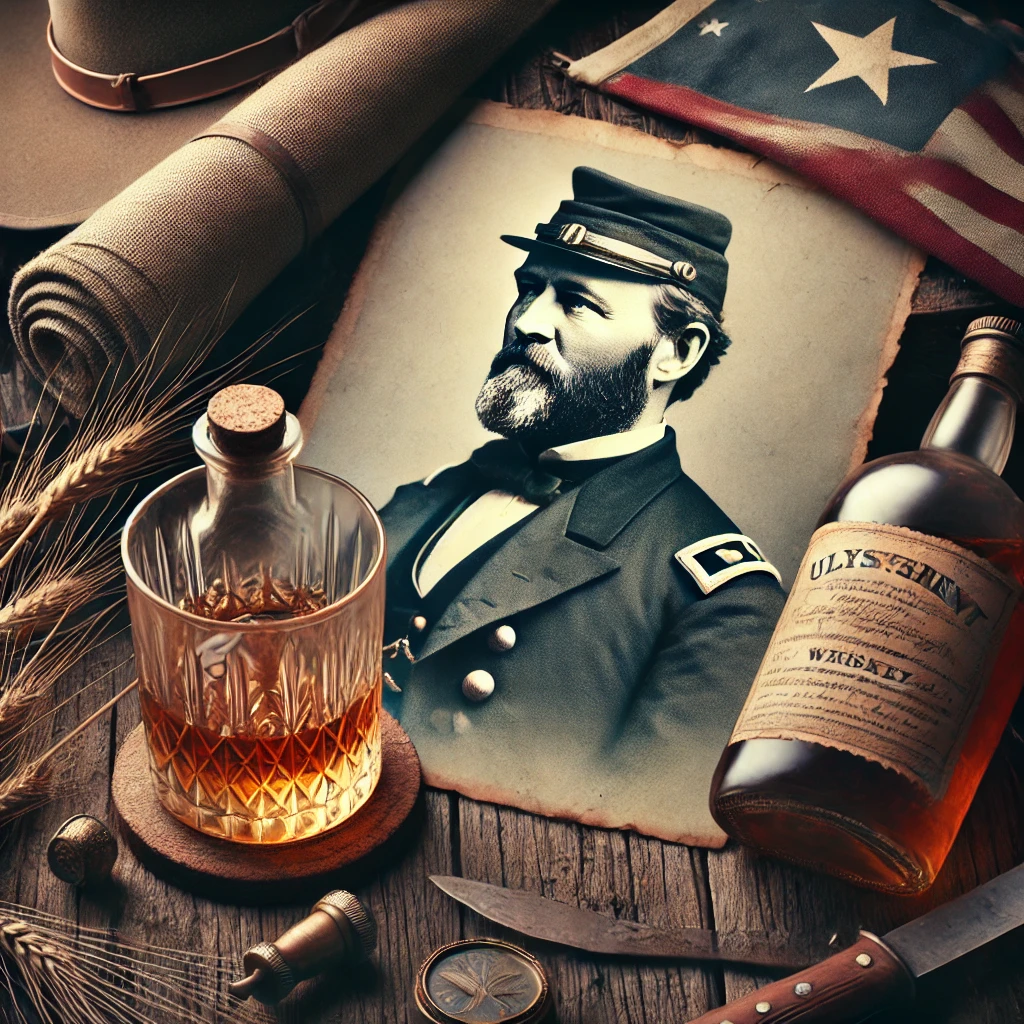Introduction
Ulysses S. Grant, America’s Civil War hero and 18th president, was known for his battlefield prowess and his determination to unite a divided nation. But another aspect of Grant’s life that became widely publicized was his connection to whiskey. Although bourbon wasn’t yet America’s Native Spirit, Grant’s association with whiskey highlighted its growing place in American culture. In today’s post, we’ll explore how Grant’s reputation as a whiskey-drinking president shaped public perceptions of American spirits and why he remains a pivotal figure in the story of whiskey and the presidency.
Grant’s Early Life and Introduction to Whiskey
Born in Ohio in 1822, Ulysses S. Grant had a modest upbringing. He attended West Point, where he developed a reputation for being quiet and reserved, focusing on his studies and military training. Grant’s time as a young soldier exposed him to whiskey, which was widely consumed among soldiers at the time. Alcohol was commonly used to relieve the stress and hardship of military life, especially in the harsh conditions of 19th-century warfare.
While Grant wasn’t a distiller or a politician who actively promoted whiskey, his personal connection to it would come to shape his public image. By the time he became a general during the Civil War, stories of Grant’s whiskey-drinking habits had started circulating, fueled in part by his enemies and critics.
Whiskey and the Civil War: The Rumors Begin
As a Union general, Grant faced immense pressure, and rumors about his whiskey consumption became a convenient talking point for his critics. At one point, a member of President Abraham Lincoln’s cabinet suggested that Grant’s drinking habits were a liability. Lincoln’s response has since become legendary: “I wish I knew what brand of whiskey Grant drinks. I would send a barrel to my other generals.” Lincoln admired Grant’s tenacity and success on the battlefield, and he was willing to overlook the rumors, recognizing that Grant’s effectiveness as a leader mattered more than his personal habits.
These anecdotes about Grant and whiskey helped solidify his image as a rugged, resilient leader who could withstand hardship. While it’s unclear how much of Grant’s reputation as a drinker was based on reality versus exaggeration, the public came to associate him with whiskey as a symbol of his toughness and frontier spirit.
Whiskey and the White House: Changing Public Perceptions
When Grant became president in 1869, he brought his whiskey reputation with him. However, he did not allow it to interfere with his duties. In fact, as president, Grant didn’t indulge in whiskey to the extent his critics suggested. His time in the White House showed the public that, despite his reputation, he was committed to leading the nation through a period of reconstruction and healing.
In a way, Grant’s public association with whiskey began to normalize whiskey-drinking among American leaders. While earlier presidents had been known to enjoy spirits privately, Grant was one of the first whose whiskey habits were widely discussed. His leadership, coupled with his reputation as a whiskey drinker, helped ease the stigma around whiskey, making it more acceptable for American men to embrace whiskey as a part of everyday life.
Grant’s Legacy and the Growth of American Whiskey
During Grant’s presidency, whiskey became increasingly popular in the United States. With the completion of the transcontinental railroad, whiskey production expanded westward, allowing distillers to transport their products more easily across the country. While bourbon wasn’t yet recognized as a distinct American spirit, Grant’s influence on public perceptions of whiskey helped set the stage for bourbon’s rise in the decades that followed.
Grant’s legacy in whiskey culture is one of resilience, grit, and unapologetic determination. Despite criticism and political challenges, he maintained his reputation as a no-nonsense leader, embodying the qualities that whiskey itself would come to symbolize. Although he didn’t actively promote whiskey or advocate for its production, Grant’s association with it reinforced the idea that whiskey could be enjoyed by America’s toughest and most respected leaders.
The Final Sip
Ulysses S. Grant’s connection to whiskey went beyond personal habit; it became a cultural marker for American toughness and resilience. His reputation as a whiskey-drinking president helped redefine the relationship between American leaders and spirits, making whiskey a symbol of rugged masculinity and endurance.
As we continue our Bourbon & the Presidency series, let’s raise a glass to Grant, the warrior president whose legacy in American whiskey culture is still felt today. Join me next time as we explore the role of whiskey in Ronald Reagan’s presidency and how he used it as a symbol of American pride.
